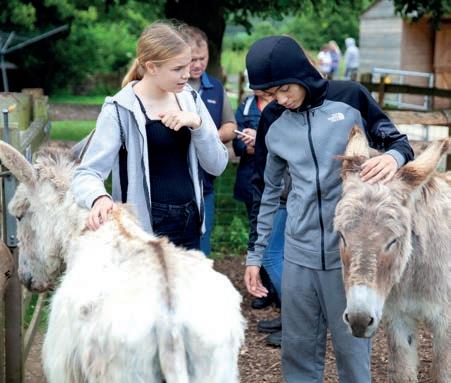
3 minute read
Countryside matters
Director of External Aff airs Jonathan Roberts outlines what the CLA is doing to ensure the countryside is at the heart of all government departments’ decision-making
here can be no doubt about
TDefra’s commitment to the countryside. We work closely with its o cials and ministers and know them to be passionate, diligent and conscientious – but at present, the government’s ways of working are too siloed to be capable of fulfi lling the economic potential of rural Britain.
For too long, o cials and ministers in other government departments have all but ignored the rural economy, in part due to a misinformed belief that ‘the countryside is Defra’s territory’.
But many of the policies the CLA promotes are not just in the remit of one government department. Matters concerning planning, housing, tax, energy production, tourism, digital and electrical connectivity are often just as important to our members as farming, but government spends far too little time considering the impact of its decisions upon those in the countryside.
The CLA’s Rural Powerhouse campaign has been chipping away at this attitude; our ever-increasing media profi le, growing digital footprint and expansive eff orts in Parliament and broader political circles are helping decision-makers look at the rural economy afresh.
The truth is that it takes considerable eff ort to change ingrained thinking. In 2021, the UK Government’s Rural Proofi ng report made a wellmeaning attempt to ensure the administration fully considered the impact of its policies on the countryside, only to recommend simply that each department appoints an o cial to loosely keep an eye on rural policy. This, I’m sure you would agree, doesn’t cut the mustard. takes o change n 2021, s Rural e a wellensure the considered cies on the ecom mme d nd par a tmen e t t o
At a time when the prime minister is trying to defi ne his Levelling Up agenda, he should note that the rural economy is 18% less productive than the national average – a gap robbing the country of up to £43bn of revenue, and potentially hundreds of thousands of good jobs. Beyond that, we know of the huge digital divide that sti es innovation, as well as communication in rural areas while young people often have tremendous di culty accessing skills and aff ordable housing, leaving them to feel they have no choice but to head for the city.
This is precisely why we need to move beyond talk of ‘rural proofi ng’ towards something rather more ambitious – a cross-departmental strategy to enhance the rural economy in England and Wales.
The CLA’s Rural Powerhouse campaign is pressuring the government to create one. In doing so, we have already developed several robust and transformational policy ideas, and have the support of an increasing number of MPs, peers, special advisers and indeed ministers themselves.
Former Defra Secretary Michael Gove’s appointment to the Department for Levelling Up, Housing and Communities provides a genuine opportunity for the CLA. A new Levelling Up white paper is to be published, and we are increasingly at the heart of the public and political debate that surrounds it. We are clear that the rural economy has every right to be part of the Levelling Up agenda – but for it to be a success, we have to end the siloed and piecemeal thinking that plagues the government’s approach to the countryside.














